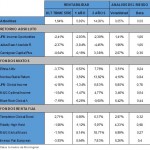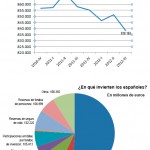¿Qué podemos esperar del mercado esta semana? 140 para tratar las cuatro áreas clave para tus finanzas y la economía global más un «Y si…»
Macro
Weak rouble – One person cheering the rise in oil prices is Vladimir Putin. Yes, you read that correctly. The dollar price of Brent crude may be down a quarter in 2014, but because Russia’s currency has fallen further, oil priced in roubles is actually up ten per cent. This makes balancing the Kremlin’s books much easier since oil and gas account for over half of federal revenues. At the official exchange rate estimate of 38 roubles to the dollar, next year’s budget requires $100 oil to break even. However with the currency now trading at 47 even current oil prices close to $85 will do. Sure, the pace of rouble depreciation is frightening – this week’s ten per cent move is the second-worst since 1999 – and risks inflation and financial stability. But at least the currency cushions the fiscal blow from falling oil.
Strategy
Earnings season – Amidst the current US and European quarterly jamboree of beats, misses, upgrades and downgrades, here are two fun facts for you. First, with two thirds of Stoxx 600 companies having reported, there is much excitement that earnings per share beats are running above 60 per cent and sales beats exceed 50 per cent. But how much have European non-financial revenues actually grown over the last year? Answer: zero. Add back financials and growth is still only one per cent. Across the pond, on the other hand, our fun fact marvels at the juggernaut that is corporate America. Most people remember that S&P 500 revenues recovered quickly to exceed their pre-crisis highs by 2010. But did you know that since the peak, US companies have now amassed additional revenues equivalent to everything they made as recently as 1995? Wow.
Stocks
CVs and batteries – Less than a dozen companies in the world worth more than $25bn will make below $4bn in revenues this year. One is Tesla, another LinkedIn. Shares in the carmaker skidded on Wednesday on production delays. LinkedIn, by contrast, jumped 13 per cent last week thanks to encouraging revenues. The skittishness mirrors an essential ingredient for inclusion in this group: hope. But there is hope and there is hope. As an industrial company Tesla will never enjoy LinkedIn’s 85 per cent gross margin (Toyota’s is 20 per cent). Hence Tesla’s forward price to earnings ratio of 400-plus is only justifiable if growth rates are far superior to those necessary to support LinkedIn’s share price (on 100 times earnings). «People don’t quite appreciate how hard it is to manufacture something,» says Elon Musk. He must pray they never have to.
Finance
Now concentrate – UK regulators announced an inquiry into banking competition this week. They should note that the country’s top-four supermarkets and retail banks both command 75 per cent share of their respective markets. But as the ongoing price war between UK grocers highlights, concentration does not imply a lack of competition. Similarly in banking ECB data show that new mortgage lending margins in Britain averaged 2.5 per cent over the past five years. That is the same as in Germany, one of the most fragmented banking markets. In addition, digitalisation and easier current account switching have encouraged many new banks in Britain. Investors must wonder at this hunt for oligopolistic, supernormal profits. After all, the big-four UK bank stocks are unchanged over five years – trailing the FTSE 100’s one-third rise and a 13 per cent return for the MSCI global banks index.
Digestif
Convergence – The Berlin Wall came down a quarter century ago on Sunday, merging the incommensurable economies of East and West Germany. How similar are the two regions today? After some catch-up the anticipated convergence petered out with per capita output in the east still a third below western levels. The absence of 12-foot high concrete did help labour mobility – since 1990 net migration from east to west is over one million. Yet Germany is no single labour market. Unemployment is four percentage points higher in the east while the east-west wage gap is stuck at 25 per cent for 15 years. Convergence takes time, if it ever happens. Seven ex-Confederate states remain among the poorest ten in America 150 years later. Meanwhile, England and Scotland are still debating their economic differences 300 years after union. Something for Brussels to ponder, too.














